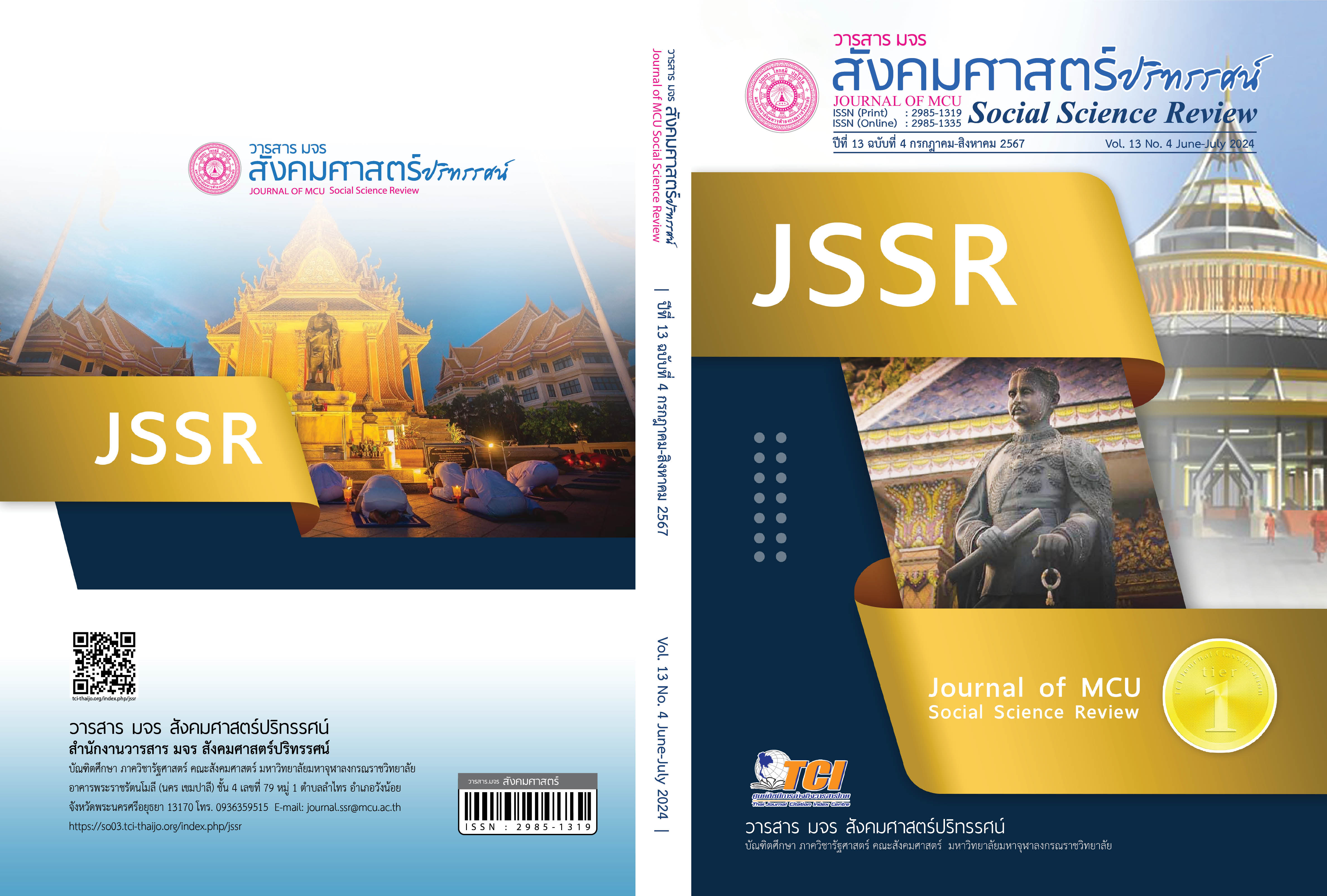ความสัมพันธ์ระหว่างพฤติกรรมการใช้หลักจิตตปัญญาศึกษากับการสร้างองค์กรแห่งการเรียนรู้ของผู้บริหารสถานศึกษา สังกัดสำนักงานเขตพื้นที่การศึกษามัธยมศึกษานนทบุรี
คำสำคัญ:
จิตตปัญญาศึกษา, องค์กรแห่งการเรียนรู้, ผู้บริหารสถานศึกษาบทคัดย่อ
บทความวิจัยนี้มีวัตถุประสงค์ 3 ประการ 1. ศึกษาระดับพฤติกรรมการใช้หลัก จิตตปัญญาของผู้บริหารสถานศึกษา 2. ศึกษาระดับการสร้างองค์กรแห่งการเรียนรู้ ของผู้บริหารสถานศึกษาในสถานศึกษา 3. ศึกษาความสัมพันธ์ระหว่างพฤติกรรมการใช้หลักจิตตปัญญาศึกษากับการสร้างองค์กรแห่งการเรียนรู้ของผู้บริหารสถานศึกษา กลุ่มตัวอย่าง คือข้าราชการครู สังกัดสำนักงานเขตพื้นที่การศึกษามัธยมศึกษานนทบุรี จำนวน 18 แห่ง จำนวนทั้งสิ้น 327 คน เครื่องมือที่ใช้ในการวิจัย คือ แบบสอบถาม สถิติที่ใช้ในการวิเคราะห์ข้อมูล ได้แก่ ค่าความถี่ ค่าร้อยละ ค่าเฉลี่ย ค่าเบี่ยงเบนมาตรฐาน และค่าสัมประสิทธิ์สหสัมพันธ์
ผลการวิจัยพบว่า 1. ระดับพฤติกรรมการใช้หลักจิตตปัญญาของผู้บริหารสถานศึกษา โดยภาพรวมและรายด้านทุกด้านอยู่ในระดับมาก 2. ระดับการสร้างองค์กรแห่งการเรียนรู้ของผู้บริหารสถานศึกษา โดยภาพรวมและรายด้านทุกด้านอยู่ในระดับมาก 3. ความสัมพันธ์ระหว่างพฤติกรรมการใช้หลัก จิตตปัญญาศึกษากับการสร้างองค์กรแห่งการเรียนรู้ของผู้บริหารสถานศึกษา ในภาพรวมมีความสัมพันธ์ทางบวก อยู่ในระดับสูงมาก อย่างมีนัยสำคัญทางสถิติที่ระดับ .01
เอกสารอ้างอิง
ธนา นิลชัยโกวิทย์. (2551). การเรียนรู้เพื่อการเปลี่ยนแปลงและจิตตปัญญาศึกษา(Transformative Learning and Contemplative Education) (พิมพ์ครั้งที่ 2). นครปฐม: มหาวิทยาลัยมหิดล.
บุญชม ศรีสะอาด. (2553). การวิจัยเบื้องต้น (พิมพ์ครั้งที่8). กรุงเทพฯ: สุวีริยาสาส์น.
บุญญาพงษ์ ดวงมาลย์ และคณะ. (2564). การพัฒนาภาวะผู้นำการเปลี่ยนแปลงของผู้บริหารสถานศึกษา ตามหลักพรหมวิหาร 4 สังกัดสำนักงานเขตพื้นที่การศึกษาขอนแก่น เขต1. วารสาร Journal of Modern Learning Development, 6(1), 250-262.
พรรณี ลีกิจวัฒนะ. (2559). วิธีการวิจัยทางการศึกษา (พิมพ์ครั้งที่11). กรุงเทพฯ: มันชอร์วิส
ซัพพลาย.
วสิษฐ์ พรหมบุตร. (2555). คุณลักษณะขององค์การแห่งการเรียนรู้และผลต่อคุณภาพการบริการ: การศึกษาเชิงประจักษ์ของโรงพยาบาลในประเทศไทย (ดุษฎีนิพนธ์บริหารธุรกิจดุษฎีบัณฑิต สาขาวิชาบริหารธุรกิจ). กรุงเทพฯ: มหาวิทยาลัยธุรกิจบัณฑิตย์.
ศรัญญา น้อยพิมาย. (2562). ทักษะการบริหารของผู้บริหารสถานศึกษา สังกัดสำนักงานเขตพื้นที่การศึกษาประถมศึกษาปทุมธานี เขต 2 (วิทยานิพนธ์ศึกษาศาสตรมหาบัณฑิต สาขาวิชาการบริหารการศึกษา). ปทุมธานี: มหาวิทยาลัยเทคโนโลยีราชมงคลธัญบุรี.
อภิชาติ พานสุวรรณ. (2560). หลักพุทธบูรณาการเครื่องมือครองใจคนของผู้บริหารยุคใหม่. วารสาร มจร สังคมศาสตร์ปรินิทรรศน์, 6(4), 100-111.
อภิญญา ฉัตรช่อฟ้า และบุญทัน ดอกไธสง. (2562). องค์กรแห่งการเรียนรู้. วารสาร มจร มนุษยศาสตร์ปรินิทรรศน์, 5(1), 157-170.
อาทิตยา ศักดิ์จันทร์ และคณะ. (2560). การศึกษาความสัมพันธ์ระหว่างการส่งเสริมกระบวนการคิดเชิงระบบกับความสำเร็จในการบริหารงานวิชาการของสถานศึกษาตามความคิดเห็นของครูสังกัดสำนักงานเขตพื้นที่การศึกษามัธยมศึกษา เขต 11 ในจังหวัดชุมพร. วารสารนาคบุตรปริทรรศน์, 9(1), 15-24.
Krejcie, R. V. & Morgan, D. W. (1970). Determining Sample Size for Research Activities. Education and Psychological Measurement, 30(3), 607-610.
Senge, P. M. (1990). The fifth discipline: The art & practice of the learning organization. New York: Currency Doubleday.
ดาวน์โหลด
เผยแพร่แล้ว
รูปแบบการอ้างอิง
ฉบับ
ประเภทบทความ
สัญญาอนุญาต
ลิขสิทธิ์ (c) 2024 วารสาร มจร สังคมศาสตร์ปริทรรศน์

อนุญาตภายใต้เงื่อนไข Creative Commons Attribution-NonCommercial-NoDerivatives 4.0 International License.
เพื่อให้เป็นไปตามกฎหมายลิขสิทธิ์ ผู้นิพนธ์ทุกท่านต้องลงลายมือชื่อในแบบฟอร์มใบมอบลิขสิทธิ์บทความให้แก่วารสารฯ พร้อมกับบทความต้นฉบับที่ได้แก้ไขครั้งสุดท้าย นอกจากนี้ ผู้นิพนธ์ทุกท่านต้องยืนยันว่าบทความต้นฉบับที่ส่งมาตีพิมพ์นั้น ได้ส่งมาตีพิมพ์เฉพาะในวารสาร มจร สังคมศาสตร์ปริทรรศน์ เพียงแห่งเดียวเท่านั้น หากมีการใช้ภาพหรือตารางหรือเนื้อหาอื่นๆ ของผู้นิพนธ์อื่นที่ปรากฏในสิ่งตีพิมพ์อื่นมาแล้ว ผู้นิพนธ์ต้องขออนุญาตเจ้าของลิขสิทธิ์ก่อน พร้อมทั้งแสดงหนังสือที่ได้รับการยินยอมต่อบรรณาธิการ ก่อนที่บทความจะได้รับการตีพิมพ์ หากไม่เป็นไปตามข้อกำหนดเบื้องต้น ทางวารสารจะถอดบทความของท่านออกโดยไม่มีข้อยกเว้นใดๆ ทั้งสิ้น





